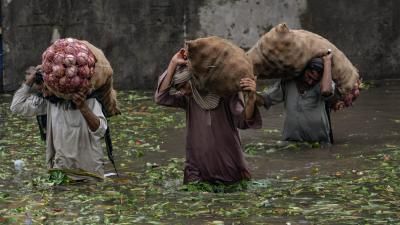
Improving access to redress for workers vulnerable to violence and harassment in South Asia
Experts discuss the factors that make some workers more vulnerable than others to violence and harassment.
This page is approximately a 3 minute read
This page was published on

The Poll found that 71% of Pakistanis went without electricity for more than a day in the 12 months prior to the survey.
This is according to the latest report from the Lloyd’s Register Foundation World Risk Poll, powered by Gallup: ‘A Resilient World? Understanding vulnerability in a changing climate’. It presents data from over 125,000 people in 121 countries and reveals how people feel their communities and their country’s infrastructure and government can cope in the face of disasters.
According to the report’s findings, Pakistan has an overall score on the World Risk Poll Resilience Index of 0.43, 22% below the global average, placing the country as the fifth least resilient country of the 111 in the Index1. Scored between 0 and 1, the Resilience Index is calculated by taking into account Poll questions that measure the individual, household, community and society-level resilience of a country.
As has been reflected recently, the 2021 Poll found that three in five Pakistani people (60%) who had experienced a disaster said it was caused by heavy rain or flooding, well above the global average of 37%.
In addition, many of the country’s residents had gone without vital resources for more than a day in the 12 months prior to the survey – almost three quarters (71%) said they had gone without electricity, more than a third (36%) said they had been unable to access medical assistance or medicine, and 42% said they had been unable to access a telephone.
With flooding worsening since the Poll was conducted, the report raises concerns around the country’s ability to cope with and recover from such disasters.
Dr Sarah Cumbers, Director of Evidence and Insight at Lloyd’s Register Foundation, said: “The devastating floods in Pakistan, coupled with what we know about the country’s resilience from the World Risk Poll, illustrates a pattern that recurs across our Resilience Index: the countries across the globe that are most exposed to the effects of natural hazards are often those most lacking in the means to cope with and recover from such events.
“By providing a detailed breakdown of the resilience strengths and weaknesses of different countries and demographics, our research can draw policymakers’ attention to the types of support they must bolster in order to improve resilience in the face of potential future disasters. If they fail to do so, the lives and wellbeing of even more people will be put at risk over the years to come.”
Funding is available from Lloyd’s Register Foundation for further research and interventions using World Risk Poll data to reduce risk and improve resilience. To find out more, click here.
Resilience Index ranking for the five least resilient countries is Afghanistan, Togo, Lebanon, Gabon and Pakistan. Not all countries in the World Risk Poll had enough data to calculate a Resilience Index Score.
Revealing how people worldwide feel their country’s infrastructure and government can cope in the face of disasters, the report provides global insights into how prepared and resilient individuals believe their communities, countries, and institutions are in dealing with hazards.
Revealing how people worldwide feel their country’s infrastructure and government can cope in the face of disasters, the report provides global insights into how prepared and resilient individuals believe their communities, countries and institutions are. (PDF, 5.46MB)

